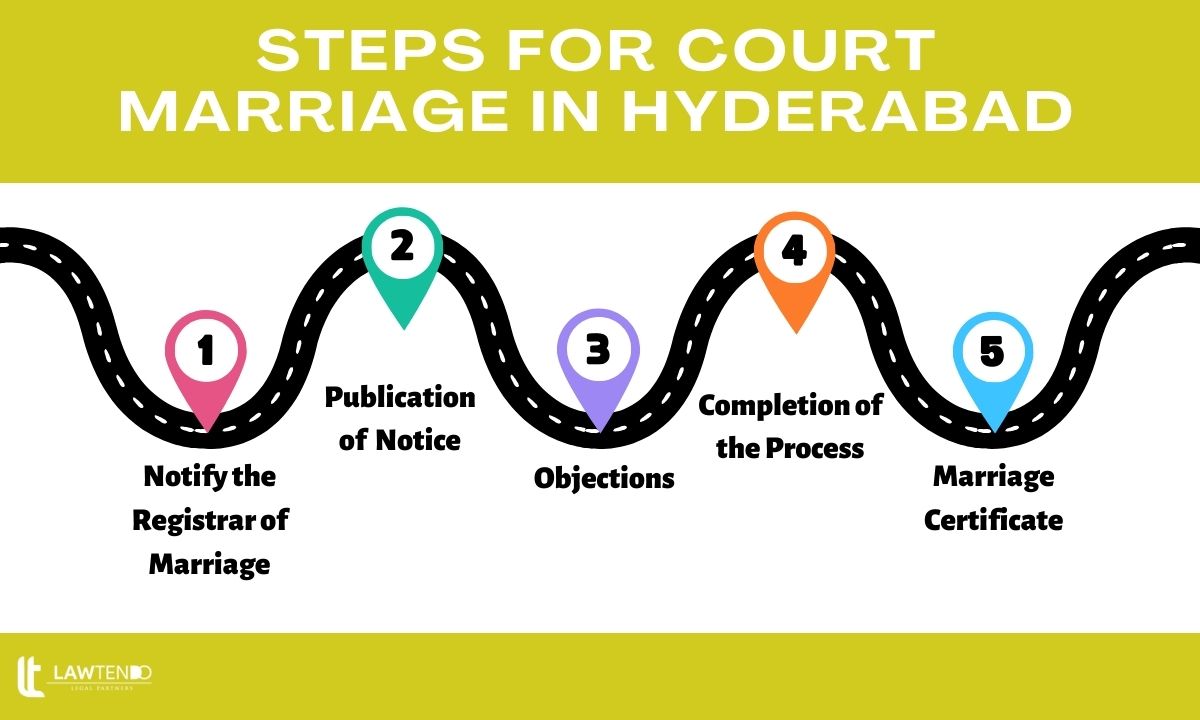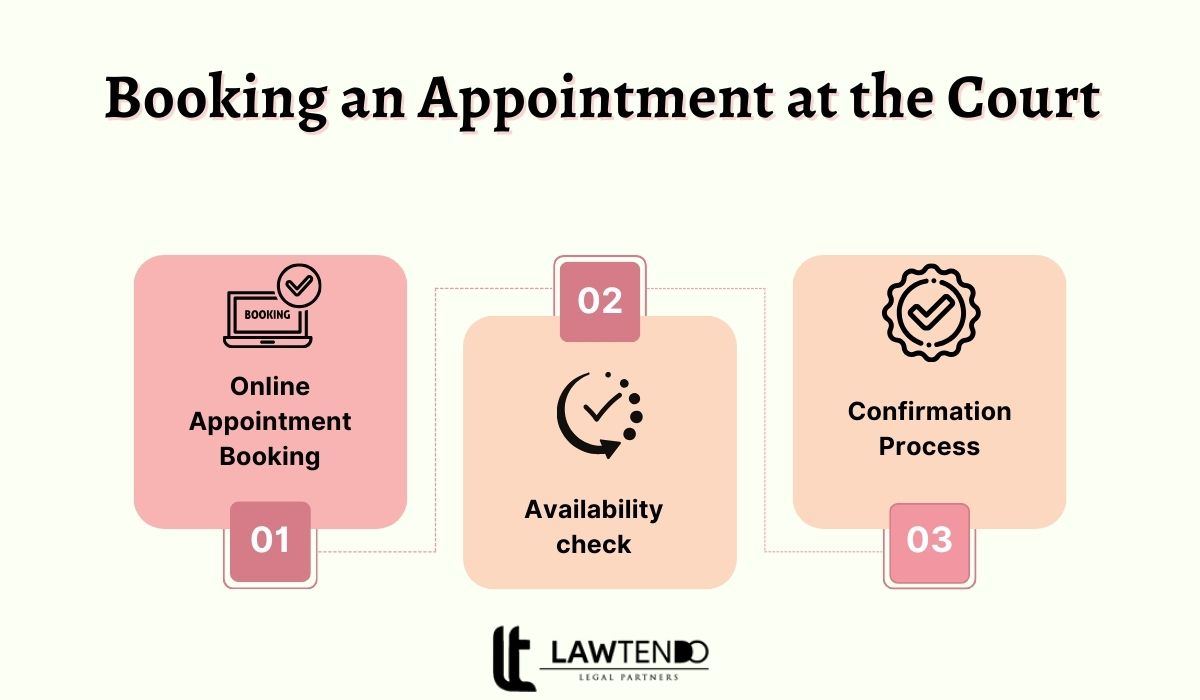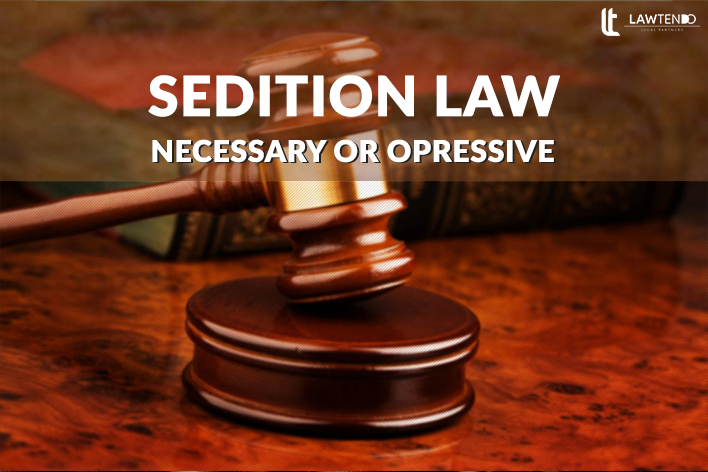BOOK A SERVICE
Overview: Court Marriage Registration In Hyderabad
The court marriage process in Hyderabad is initiated through a well-defined set of phases that emphasise the importance of wedded unity while guaranteeing compliance with legal requirements. The process winds through the complex labyrinth of legal formalities, starting with the filing of the Notice of Intended Marriage, a crucial document that initiates the legal process, and ending with the marriage certificate. This in-depth manual aims to clarify the procedural nuances, providing couples with the knowledge they need to start their marriage off with clarity and confidence.
Couples from a variety of backgrounds are welcome to embark on this legal journey, as the city's unique tapestry reflects its global ethos. Hyderabad's legal system reflects the city's blend of technology and tradition, providing a peaceful union for individuals who prefer to go through the court marriage process.
Legal Procedures and Acts
Special Marriage Act, 1954
The Special Marriage Act, 1954 governs court marriages in India, providing a legal framework for couples of different religions or those choosing a civil ceremony. Under this act, couples in Hyderabad can register their marriage in the court, ensuring a secular and uniform procedure.
Hindu Marriage Act, 1955
The Hindu Marriage Act, 1955 is applicable to Hindus, Jains, Sikhs, and Buddhists, providing regulations for Hindu marriages. While different from court marriages, understanding this act is crucial, especially if either party is Hindu, as it outlines the rituals and ceremonies recognized under Hindu traditions.
Role of Marriage Officers and Registrars
Marriage officers and registrars play a pivotal role in court marriages in Hyderabad. They are designated individuals responsible for overseeing the marriage registration process. The marriage officer ensures compliance with legal formalities, verifies documents, and facilitates the solemnization of the marriage.
What Are The Advantages Of A Court Marriage In Hyderabad?
- Economical: Court marriages in Hyderabad are less costly than traditional marriages, which can be very costly.
- Recognition: Legal recognition of court marriages is also available in Hyderabad, where a court-issued marriage certificate acts as evidence of the relationship.
- No Restrictions: A civil wedding that happens outside and isn't constrained by custom or religion is called a court marriage. Anyone can access it, regardless of caste, creed, or religion.
- Privacy: Court marriages are small-scale, private events with few guests and no excessive details.
Eligibility Criteria For Processing A Court Marriage In Hyderabad
- Age Specifications: Individuals must be at least the legal minimum age for both male and female spouses in order to be married in get married in Hyderabad. The minimum age requirements for both couples are 18 and 21, respectively.
- Partners' Mutual Consent: It is essential that both partners provide their consent. The couples want to make a vow together. They have made the decision to wed voluntarily, free from compulsion or duress.
- Non-Prohibited Relationships: Some marriages are forbidden according to religion and custom. Certain relationships are prohibited by various laws and religions in India. Neither of the spouses may have been involved in these partnerships prior to marriage.
- Bigamy: Bigamy is forbidden in Hyderabad, so there are no active relationships. It is possible that none of the parties had previously been in a committed relationship. Regarding prior relationships, either party has passed away or they have a court-issued divorce decree. One of the following: a death certificate or divorce order.
Documents Required For Court Marriage In Hyderabad
- Registration: Both the husband and the wife must sign the application.
- Proof of the bride and groom's current residential address (which can be shown via a driver's licence, voter ID, ration card, or passport)
- Two passport-sized photos
- Two pictures of the bride and groom's wedding taken during the ceremony, signify their participation in it.
- Three people attest to the marriage.
- It is necessary to have marriage affidavits from both the husband and the wife in a certain format.
- husband and wife's birth certificates (preferably, the 10th grade report card with the date of birth on it, as this serves as documentation of proof of age)
- Adhaar card
- Marriage invitation card
- Self-attestation is required for all documents.
How To Apply For Court Marriage In Hyderabad?

-
Notify the Registrar of Marriage:
- Submit a marriage application to the district marriage officer.
- Choose a district where either partner has resided for over thirty days.
- Ensure the application reaches the marriage officer thirty days before the scheduled court wedding.
- Both parties must sign the marriage application.
-
Publication of Notice:
- The marriage officer posts the notice of the intended marriage for 30 days.
- As per Section 6 of the Special Marriage Act, 1954, maintain the notice prominently within the marriage office.
- All marriage applications are recorded and updated in the "Marriage Notice Book" by the marriage registrar.
-
Objections:
- Anyone objecting to the marriage can personally communicate concerns to the marriage officer under Section 7 of the Special Marriage Act, 1954.
- The marriage commissioner holds the authority to investigate objections and potentially halt the union.
- If no objections arise, the marriage proceeds in court with the presence of the marriage registrar.
-
Completion of the Process:
- Unlike traditional marriages, court marriages lack ceremonies.
- Both partners, along with three witnesses, sign the marriage declaration form in front of the marriage registrar.
- This step finalizes the court marriage process for both parties.
Cultural and Religious Aspects
Arya Samaj Marriage and Inter-Religious Marriages
In the context of court marriages in Hyderabad, Arya Samaj marriage holds significance for couples seeking a ceremony based on Vedic rituals. This cultural choice provides a unique alternative, emphasizing simplicity and equality. Additionally, inter-religious marriages bring together individuals from diverse faiths, highlighting the acceptance of cultural diversity within the legal framework.
Role of Cultural Practices in Court Weddings
The role of cultural practices in court weddings cannot be understated. While court marriages are known for their simplicity, couples often incorporate cultural elements to personalize their ceremony. This may include rituals, customs, or traditions representing their cultural background, making the event more meaningful for the parties involved.
Marrying Under Different Religious Laws
Hyderabad, being a city with cultural diversity, witnesses marriages under various religious laws. Couples opting for court marriages may still choose to marry under their respective religious laws, depending on personal preferences. This choice reflects the respect for individual beliefs and ensures that the marriage aligns with the religious principles of the parties involved.
Supreme Court Guidelines
Relevant Guidelines from the Supreme Court
The Supreme Court, as the apex legal authority in India, provides crucial guidelines that influence court marriages. These guidelines address various aspects, ensuring uniformity and legality in the marriage registration process. Couples in Hyderabad must be aware of and adhere to these guidelines for a legally sound court marriage.
Supreme Court Decisions on Court Marriages
The Supreme Court decisions related to court marriages set precedents and interpretations that impact the legal landscape. These decisions may cover issues like eligibility criteria, documentation requirements, or procedural nuances. Staying informed about these decisions is essential for couples in Hyderabad to navigate the legal intricacies of court marriages effectively.
Fees Requirements For Court Marriage In Hyderabad
- Rs.100/- in the case of the Hindu Marriage Act
- Rs.150/- in Special Marriage Act
Booking an Appointment at the Court:

To initiate the marriage registration process in Hyderabad, couples must first book an appointment at the court.
- Online appointment booking: In Hyderabad, couples can conveniently schedule their appointment for marriage registration through the online portal provided by the court. This online system allows couples to choose a date and time slot that fits their schedule.
- Availability check: It's essential for couples to check the availability of slots for marriage registration appointments on the designated dates. This ensures that they can secure a convenient appointment without any scheduling conflicts.
- Confirmation process: After successfully booking the appointment, couples receive confirmation of their appointment along with details regarding the required documentation and fees. This confirmation serves as a crucial step in the process, providing couples with the necessary information to prepare for their appointment.
Booking an appointment at the court is the first step towards registering a marriage in Hyderabad. By utilizing the online appointment booking system, couples can streamline the process and ensure a smooth start to their marriage registration journey.
Marriage Notice Submission Process:
One of the initial steps in registering a marriage in Hyderabad is the submission of marriage notices at the registrar's office.
- Notice submission timeline: Couples are required to submit their marriage notices at the designated marriage registrar's office in Hyderabad at least 30 days prior to the intended date of marriage. This timeline allows for public notification and objection periods as per legal requirements.
- Required documents: To submit the marriage notice, couples need to provide necessary documents such as identity proof, address proof, marriage application form, and passport-sized photographs of both individuals. These documents are essential for verifying the identity and eligibility of the couple.
- Publication of notice: After submitting the marriage notice, it is published on the official notice board at the registrar's office for public information. This publication serves to notify the public about the impending marriage and allows for objections to be raised if necessary.
The submission of marriage notices is a crucial step in the marriage registration process in Hyderabad. By adhering to the required timeline and providing the necessary documents, couples ensure compliance with legal regulations and transparency in the marriage registration process.
Witness Requirements for Court Marriage:
Witnesses play a significant role in the court marriage process in Hyderabad, providing legal attestation to the marriage.
- Selection of witnesses: Couples are required to identify two witnesses who meet the eligibility criteria specified by the marriage registration authorities. These witnesses must be of legal age and not directly related to the couple by blood or marriage.
- Eligibility criteria: Witnesses must meet specific eligibility criteria to ensure the validity of their testimony. They should be of sound mind, not be disqualified by law from giving evidence, and have a clear understanding of the marriage ceremony they are witnessing.
- Role of witnesses: During the court marriage ceremony, witnesses play a crucial role by witnessing the exchange of vows and rings and signing the marriage register as a legal attestation to the marriage. Their signatures affirm the legality and authenticity of the marriage ceremony.
Choosing suitable witnesses is essential for the court marriage process in Hyderabad. By selecting individuals who meet the eligibility criteria and understand their role as witnesses, couples ensure the validity and legality of their marriage registration.
Procedure for Solemnization of Marriage:
The solemnization of marriage marks the official union of the couple, recognized by law in Hyderabad.
- Court marriage ceremony: Couples attend the court marriage ceremony at the designated marriage registrar's office in Hyderabad on the scheduled date and time. The ceremony is conducted in the presence of the registrar, witnesses, and the couple.
- Marriage solemnization: During the ceremony, couples exchange vows and rings, sign the marriage register, and receive blessings from the registrar. This formalizes the marriage and establishes it as a legal union under the law.
- Legal validation: After the marriage ceremony is solemnized, the registrar validates the marriage by registering it in the official records. The couple receives the marriage certificate on the same day, confirming the legal validity of their marriage.
The solemnization of marriage is a significant milestone in the marriage registration process in Hyderabad. By participating in the ceremony and completing the necessary formalities, couples officially establish their marital status under the law.
Obtaining the Marriage Certificate:
The marriage certificate serves as tangible proof of the marriage, essential for various legal and administrative purposes.
- Issuance of certificate: Following the solemnization of marriage, the marriage registrar issues the marriage certificate to the couple immediately. This certificate serves as official proof of the marriage and contains essential details such as the names of the spouses, date of marriage, and registration number.
- Legal significance: The marriage certificate holds legal significance as it establishes the marital status of the couple under the law. It is required for various legal and administrative purposes, including visa applications, passport updates, and property transactions.
- Duplicate certificate: In case of loss or damage to the original marriage certificate, couples can apply for a duplicate certificate through the prescribed procedure at the registrar's office. This ensures that they have access to a valid proof of marriage at all times.
Obtaining the marriage certificate is the final step in the marriage registration process in Hyderabad. By securing this official document, couples gain legal recognition of their marriage and can proceed with further administrative procedures as needed.
Post-Registration Formalities and Tips:
After completing the marriage registration process in Hyderabad, couples may need to undertake certain post-registration formalities.
- Name change procedure: Upon receiving the marriage certificate, couples may choose to update their personal records and documents with their new marital status and surname. This may include updating identification cards, bank accounts, and official registrations to reflect the marriage.
- Social security benefits: Married couples may be eligible for various social security schemes and benefits offered by government agencies. This may include health insurance coverage, pension benefits, and other financial assistance programs.
- Legal advice: Couples may seek legal advice or assistance for any post-registration formalities or legal implications related to the marriage. This may include consulting with a legal expert to understand their rights and responsibilities as married individuals.
Completing post-registration formalities ensures that couples can fully enjoy the legal and social benefits of their marriage. By staying informed and proactive, couples can navigate the post-registration process with ease and confidence.
FAQ's
Q: What is the Special Marriage Act, 1954, and how does it relate to court marriages in Hyderabad?
A: The Special Marriage Act, 1954, governs court marriages in India, allowing individuals from different religions or those opting for a civil ceremony to register their marriage.
Q: Can we choose any district in Hyderabad for submitting our marriage application?
A: Yes, you may select a district in which either partner has resided for over thirty days to submit the marriage application.
Q: Is there a specific timeframe for submitting the marriage application to the district marriage officer?
A: The application must reach the marriage officer at least thirty days before the scheduled court wedding.
Q: Are there any specific requirements for signing the marriage application?
A: Both parties involved must sign the marriage application.
Q: What is the significance of the 30-day notice period in court marriages in Hyderabad?
A: The 30-day notice period allows for the publication of the intended marriage, providing time for any objections to be raised.
Q: How is the notice of the intended marriage published, and for how long?
A: The marriage officer posts the notice for 30 days, as required by Section 6 of the Special Marriage Act, 1954.
Q: Where is the notice of the intended marriage displayed?
A: The notice is prominently displayed within the marriage office.
Q: What is the "Marriage Notice Book," and why is it maintained by the marriage registrar?
A: The Marriage Notice Book is where all marriage applications are recorded and updated for legal documentation purposes.
Q: Can objections to the marriage be raised, and how are they addressed?
A: Yes, objections can be raised under Section 7 of the Special Marriage Act, 1954, and the marriage commissioner has the authority to investigate and potentially halt the union.
Q: What happens if there are no objections to the marriage procedure?
A: If there are no objections, the marriage proceeds in court with the presence of the marriage registrar.
Q: How does the court marriage process differ from traditional marriages in terms of ceremonies?
A: Court marriages are distinct as they lack traditional ceremonies, focusing on a straightforward legal process.
Q: Who needs to sign the marriage declaration form, and in front of whom?
A: Both partners, along with three witnesses, sign the marriage declaration form in front of the marriage registrar.
Q: Are there any cultural practices incorporated into court weddings in Hyderabad?
A: While court weddings are typically simple, couples may choose to incorporate cultural elements to personalize their ceremony.
Q: Can court marriages in Hyderabad be conducted under different religious laws?
A: Yes, couples may choose to marry under their respective religious laws, reflecting their personal beliefs.
Q: What role does the Supreme Court play in court marriages, and are there relevant guidelines?
A: The Supreme Court provides crucial guidelines that influence court marriages, ensuring uniformity and legality in the marriage registration process.
Why Choose Lawtendo






Click here to know about Court Marriage Process In Adilabad



